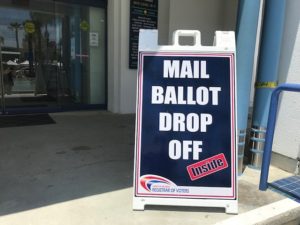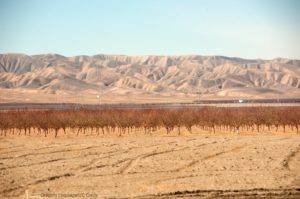Reality Check; California Dreaming
 I worked as a mail ballot drop-off monitor for the San Diego County Registrar of Voters. That means I was one of the people tending a big red ballot box for the last four weeks while we wasted $300 million verifying that we really did want Gavin Newsom as governor. California makes it very easy to vote, by mailing ballots to everyone, and giving voters many options and lots of time to return their ballots. You could put them in the mail, postage paid; drop them at one of many locations available for four weeks; or go to a polling place during the three days leading up to the actual election day. It was reassuring that there was high voter turnout, and a clear outcome.
I worked as a mail ballot drop-off monitor for the San Diego County Registrar of Voters. That means I was one of the people tending a big red ballot box for the last four weeks while we wasted $300 million verifying that we really did want Gavin Newsom as governor. California makes it very easy to vote, by mailing ballots to everyone, and giving voters many options and lots of time to return their ballots. You could put them in the mail, postage paid; drop them at one of many locations available for four weeks; or go to a polling place during the three days leading up to the actual election day. It was reassuring that there was high voter turnout, and a clear outcome.
Recently my husband and I drove from San Diego to San Jose, following Interstate 5 through the Central Valley. The temperatures were cooler than usual, “only” in the low 90s. There were many “Recall Newsom” and “Larry Elder” signs, not yet taken down despite the recall election results, along with billboards that read “Build More Dams, Prevent Manmade Droughts.”

As we passed extensive acreage with grapevines and what we think were almond trees, it was easy to imagine the fear of these landowners, these farmers, as they face the ever stronger impacts of climate change and population growth on their access to the water essential for their economic survival. One imagines the generations and the sweat that built up these land holdings and nurtured these groves and vineyards, and their reluctance to give it all up.
What I have trouble imagining is why these agricultural entrepreneurs think that a climate-denying political party would help them. What I don’t understand is why they haven’t taken relatively easy actions to conserve water and reduce greenhouse gas emissions. We saw open, uncovered waterways that allow the sun’s radiation to evaporate their precious resource. More than ten years ago I was reading about floating covers for reservoirs and canals to reduce evaporation, some with photovoltaics that generate energy. If as much effort (and money) went into energy and water saving modifications as goes into negative politics, they might be able to save their businesses.
We, as a society, need to worry about what happens to agricultural workers who can no longer make a living in their field, and how our growing population’s food needs will be met. We need to figure out how to promote climate adaptation strategies, such as regenerative agriculture, moving to more plant-based diets, and growing crops that take less water. It will take a toolbox full of new ideas and resurrected ancient practices to allow us all to thrive on our stressed planet.
I still have hope that we will recognize our common interest in moving to a more sustainable future, socially, politically, and biologically. We are all in the same boat. There is no room for “personal freedom” if it means taking action (or avoiding action) that will sink all of us.